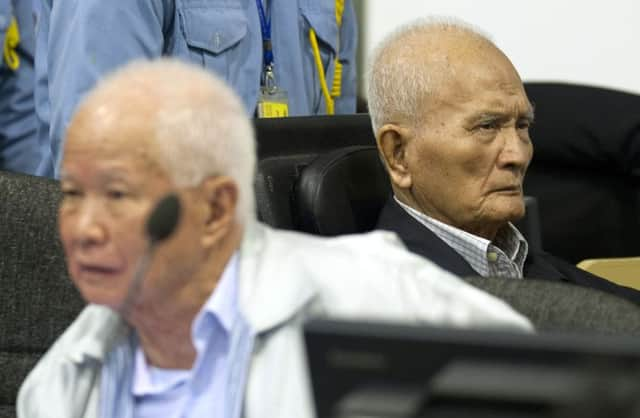Cambodia Khmer Rouge leaders facing genocide trial


Khmer Rouge head of state, Khieu Samphan, 83, and Nuon Chea, 88, right-hand-man to the group’s late chief, Pol Pot, are among the few surviving top leaders of the brutal Communist group that was responsible for about 1.7 million deaths from starvation, exhaustion, disease and execution when it was in power in 1975-79.
It will be the second case for the defendants, who have already been tried for war crimes and crimes against humanity in relation to forced evacuations and a mass execution, one of many massacres at sites around the country that came to be known as the “killing fields”.
Advertisement
Hide AdAdvertisement
Hide AdThe verdict in that two-year trial is due next week. If found guilty, the two men are likely to die in prison.
The new trial brings additional charges of genocide, alleging that Marxist leader Pol Pot and other senior leaders intended to wipe out the members of the country’s Vietnamese and Muslim Cham ethnic minorities.
Pol Pot and the Khmer Rouge forced millions of people from the cities to work on communal farms in the countryside. But the dramatic attempt at social engineering resulted in whole families dying from starvation, disease and overwork, as well as there being many executions.
Hundreds of thousands of ethnic Vietnamese were forced into Vietnam, and virtually all of those remaining in Cambodia were executed. Estimates of the number of Chams killed range from 90,000 to 500,000.
International deputy co-prosecutor William Smith, of Australia, said the team felt there was sufficient evidence to bring such cases.
In today’s initial hearing, lawyers and judges will discuss which witnesses and experts will be called, the issue of requests for reparations, and procedural legal objections.
The judges expect the actual trial to begin towards the end of this year, said Lars Olsen, a tribunal spokesman.
Those forced to flee retained no documentation proving their Cambodian origins, so when they returned they were plunged into statelessness. Today, hundreds of thousands of ethnic Vietnamese remain undocumented, living on the fringes of society without access to proper schooling, healthcare, jobs or social services.
Advertisement
Hide AdAdvertisement
Hide AdThe trial also marks the first time rape and forced marriage will be addressed by the court as offences considered crimes against humanity.
Court officials and historians had argued that the Khmer Rouge policy banning sexual relations among unmarried couples was proof rape could not have been widespread or systematic. But Duong Savorn, head of the gender-based violence team at the Cambodian Defenders Project, said his research has suggested there were “many, many cases” of rape.
After years of legal and political wrangling, the Khmer Rouge tribunal was established in 2006. But since then, the court has been plagued by corruption, mismanagement, and financial woes. The hybrid structure of the court, in which United Nations-appointed international judges share the bench with Cambodian counterparts, has led to allegations of political interference and repeated deadlocks.
To date, only a single conviction has been obtained by the tribunal. It sentenced Kaing Guek Eav, also known as Duch, the director of the S-21 torture centre, to life imprisonment in a case where reams of documentation and a confession made for as smooth a trial as possible.
The first trial of the leaders took two years, and experts say the second trial, which covers more cases and crimes, could take much longer.
Both ageing defendants are ailing in health. Khieu Samphan has been hospitalised for high blood pressure and breathing problems, while the health woes of Nuon Chea led to repeated adjournments during the last trial.
Mr Smith acknowledged that age could pose a problem.
But he said: “The most important point is these leaders are put on trial for these crimes. In a sense, the process is more important than the endpoint – that there is a rule of law and people must be held to account, whether you get to the end or not.”